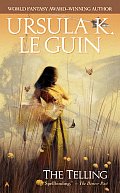
| Publisher: | Ace |
| Copyright: | 2000 |
| Printing: | August 2003 |
| ISBN: | 0-441-01123-3 |
| Format: | Mass market |
| Pages: | 231 |
Sutty comes from Earth, a refugee from the religious wars and the Time of Cleansing. She escaped thanks to the contact with the Hain and applied and trained to join the Hainish Observers, the representatives that they send throughout the galaxy to make contact with and understand other species. The Telling tells the story of her first mission, to the world Aka which is consumed by an obsession with technology and forward progress. It is, on the surface, the opposite of the religious obsession she escaped on Earth, but she finds more and more disturbing parallels. She's fighting self-doubt and intense discomfort with her assignment when she gets the opportunity to leave the city and its ever-present propaganda to the country and investigate remnants of Aka's almost-destroyed earlier beliefs.
The Telling is set in Le Guin's Hainish universe. The Hain are an advanced, very old species that takes a long view and is devoted to understanding and preserving culture and diversity. They follow something akin to the Star Trek Prime Directive in attempting to avoid interference in the cultures of the people they encounter, but with some key exceptions. Sutty is trained in that philosophy, but she has a deep revulsion for the dominant culture on Aka and its constant propaganda and condemnation of anything considered backward-looking or contrary to the corporate state. The conflict between judgement and understanding, between observation and active interference is at the center of this book.
The primary problem I had with this book is that the moral contrast between the corporate state culture and the Telling that Sutty uncovers and learns is stark to the point of caricature. Thematically, the corporate propaganda has to be heavy to force Sutty's revulsion and bring in her memories of the religious fanatics on Earth, but it was so thorough that I had a hard time believing in the resulting society. It's a bit like a capitalist North Korea, with a weird mix of emphasis on purely economic relationships and collective action that makes it neither a libertarian dystopia nor an authoritarian one. If it had been a short-lived culture, I think I could have bought it as an oddly distorted understanding of capitalism imposed on a fundamentally cooperative people. I think that's where Le Guin was going. But given how long it was asserted in the book to have lasted, it always felt like two tendencies that don't fit together with the stability implied. It deserves points for creativity, and there's some (not entirely successful) justification for it in the slowly-uncovered world background, but for me it didn't quite work.
The philosophy of the Telling feels better-designed. It's clearly the favored philosophy, but Le Guin rounds it out by building in some drawbacks as well as advantages. It is the utopian half of a utopian/dystopian pair, so those disadvantages are a bit underplayed and the viewpoint is entirely in sympathy with the Telling, but there's enough nuance for some realism. The key core of the philosophy is its emphasis on story and interpretation of story, which carries with it a deep appreciation for alternatives, multiple interpretations, and multiple choices. A philosophy built on stories, story-telling, and appreciation of learning obviously wins the reader's sympathies immediately. Since most of the book is a gradual revealing of the philosophy and Sutty's reactions to it, that makes for appealing reading. The Telling, as is typical for Le Guin, is a bit quiet and slow compared to many SF novels, but it held my attention.
The plot, though, is less satisfying. Sutty finds some framework to deal with her past and finds her feet as an Observer, and there's a nice (if somewhat sudden and simplistic) resolution of the basic cultural problem of Aka at the end of the book. The basic structure of a good philosophical novel is there. But the too-sharp contrast between the "sides" hurt my suspension of disbelief in the world and therefore hurt my willingness to believe in the proposed solution, and filled much of the rest of the book with an unpleasant sense of dread. Le Guin presents some themes I've seen before in her work, such as the need for ambiguity, balance, and flow with the world in personal philosophy, and while they're enjoyable still to read and think about, I think she handled them better in other books. And I could never get past the obsessive, oppressive dominant culture, which struck me as highly unstable and unlikely to have survived for as long as is stated here, as well as too hissable of a villain for Le Guin's normal subtlety.
This is not a bad book; I doubt Le Guin could write a bad book. But among the many excellent novels she's written, I think this is a more minor work.
Reviewed: 2010-02-27